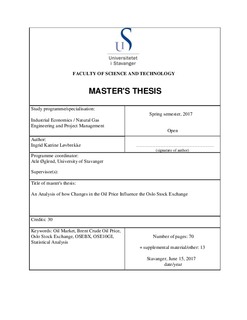| dc.contributor.advisor | Øglend, Atle | |
| dc.contributor.author | Løvbrekke, Ingrid Katrine | |
| dc.coverage.spatial | Norway | nb_NO |
| dc.date.accessioned | 2017-09-22T11:16:59Z | |
| dc.date.available | 2017-09-22T11:16:59Z | |
| dc.date.issued | 2017-06-15 | |
| dc.identifier.uri | http://hdl.handle.net/11250/2456246 | |
| dc.description | Master's thesis in Industrial economics | nb_NO |
| dc.description.abstract | This master thesis was written at the University of Stavanger (UiS), department of Industrial Economics, Risk Management and Planning, during the spring of 2017. The idea behind stems from interests in oil price changes and how the Norwegian economy is affected by it. The aim for this paper is to study the impact of oil price fluctuations on the Oslo Stock Exchange benchmark index (OSEBX), by investigating the changes in the crude oil price for the period from 2001 to 2016. Since Norway is built on oil richness, it’s stock markets are likely to be susceptible to oil price shocks. Regression analysis is used to analyze the relationship among the variables.
It is generally accepted that oil has been vitally important for the global economy, and the world has experienced growth in consumption for the majority of years since the 1900s. The global importance of oil is likely to continue in the years to come as well. Oil is the world’s primary fuel, and demand is ever-growing. In 2015, there was about 1.2 billion passenger cars in the world, and over 98% of them relied on oil. This number is expected to grow in the years to come. Increasing number of vehicles has an obvious influence on the demand for gasoline and diesel fuel. Engineers stated in 2015 that only 12% of the 9 trillion barrels of oil in place globally has been extracted yet (Clemente, 2015). Oil is the main reason the world is globalized, and its importance will continue in the following years.
The fact that oil price movements have been a subject of discussion for centuries is one of the factors driving me to write this thesis. Economists and policy makers have shown increasing concerns regarding speculation and extreme oil price movements. Production and exportation of oil and gas are important parts of the Norwegian economy, and should therefore have a strong effect on the stock market. In the long run, we see that there is a strong correlation between the changes in the oil price and the changes in the OSEBX. When studying four different short-run periods, we see that the correlation is low for all periods except the last. Generally, the OSEBX can just to some extent be said to be driven by the oil price. Other external factors are driving the changes. The overall conclusion is that the oil price has a positive effect on the OSEBX index. Only indexes related to the oil market will be significantly influenced by changes in the price of oil. | nb_NO |
| dc.language.iso | eng | nb_NO |
| dc.publisher | University of Stavanger, Norway | nb_NO |
| dc.relation.ispartofseries | Masteroppgave/UIS-TN-IØRP/2017; | |
| dc.subject | Oslo Stock Exchange | nb_NO |
| dc.subject | OSEBX | nb_NO |
| dc.subject | OSE10GI Index | nb_NO |
| dc.subject | industriell økonomi | nb_NO |
| dc.subject | prosjektledelse | nb_NO |
| dc.subject | naturgass | nb_NO |
| dc.subject | oljepris | nb_NO |
| dc.subject | regression analysis | nb_NO |
| dc.subject | Brent crude oil price | nb_NO |
| dc.title | An Analysis of how Changes in the Oil Price Influence the Oslo Stock Exchange | nb_NO |
| dc.type | Master thesis | nb_NO |
| dc.subject.nsi | VDP::Samfunnsvitenskap: 200::Økonomi: 210 | nb_NO |
| dc.source.pagenumber | 84 | nb_NO |
